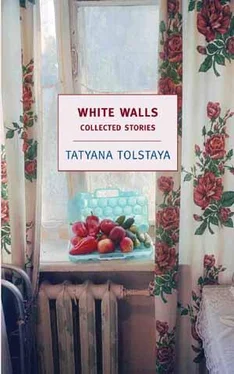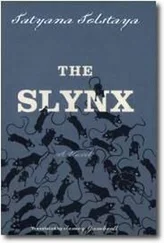…Autumn. Rain. Alexandra Ernestovna, do you remember me? It’s me! Remember… well, it doesn’t matter, I’ve come to visit. Visit—ah, how wonderful! Come here, this way, I’ll clear… I still live alone. I’ve survived them all. Three husbands, you know? And Ivan Nikolayevich, he wanted me, but… Maybe I should have gone? What a long life? That’s me. There too. And that’s my second husband. I had three husbands, did you know? Of course, the third wasn’t so…
The first was a lawyer. Famous. We lived very well. Finland in the spring. The Crimea in the summer. White cakes, black coffee. Hats trimmed with lace. Oysters—very expensive… Theater in the evening. So many admirers! He died in 1919—stabbed in an alley.
Oh, naturally she had one romance after another all her life, what else do you expect? That’s a woman’s heart for you. Why, just three years ago, Alexandra Ernestovna had rented the small room to a violinist. Twenty-six years old, won competitions, those eyes!… Of course, he hid his feelings; but the eyes, they give it away. In the evenings Alexandra Ernestovna would sometimes ask him, “Some tea?” And he would just look at her and say no-o-thing in response. Well, you get it, don’t you?… Treacherous! He kept silent all the time he lived at Alexandra Ernestovna’s. But you could see he was burning up and his soul was throbbing. Alone in the evenings in those two small rooms—You know, there was something in the air—we both felt it… He couldn’t bear it and would go out. Outside. Wander around till late. Alexandra Ernestovna was steadfast and gave him no encouragement. Later—on the rebound—he married some woman, nothing special. Moved. And once after his marriage he ran into Alexandra Ernestovna on the street and cast such a look at her—he burned her to ashes. But said nothing. Kept it all bottled up in his soul.
Yes, Alexandra Ernestovna’s heart had never been empty. Three husbands, by the way. She lived with her second husband in an enormous apartment before the war. A famous physician. Famous guests. Flowers. Always gay. And he died merrily: when it was clear that this was the end, Alexandra Ernestovna called in gypsies. You know, when you see beauty, noise, merriment — it’s easier to die, isn’t it? She couldn’t find real gypsies. But Alexandra Ernestovna, inventive, did not lose heart, she hired some dark-skinned boys and girls, dressed them in rustling, shiny, swirling clothes, flung open the doors to her dying husband’s bedroom—and they jangled, howled, babbled, circled and whirled and kicked: pink, gold, gold, pink. My husband didn’t expect them, he had already turned his gaze inward and suddenly here they were, squealing, flashing shawls; he sat up, waved his arms, rasped: go away! But they grew louder, merrier, stamped their feet. And so he died, may he rest in peace. But the third husband wasn’t so…
But Ivan Nikolayevich… ah, Ivan Nikolayevich. It was so brief: the Crimea, 1913, the striped sun shining through the blinds sawing the white scraped floor into sections… Sixty years passed, but still… Ivan Nikolayevich lost his mind: leave your husband right now and come to the Crimea. Forever. She promised. Then, back in Moscow, she thought: what will we live on? and where? He showered her with letters: “Sweet Shura, come, come to me!” Her husband was busy, rarely home; while there in the Crimea, on the gentle sands under the blue skies, Ivan Nikolayevich paced like a tiger: “Sweet Shura, forever!” While the poor man didn’t have enough money for a ticket to Moscow. Letters, letters, every day letters for a whole year—Alexandra Ernestovna will show them to me.
Ah, how he loved me! Should I go or not?
A human life has four seasons. Spring! Summer. Autumn… Winter? But winter was behind Alexandra Ernestovna—where was she now? Where were her moist, colorless eyes directed? Head back, red lid pulled away, Alexandra Ernestovna squeezes yellow drops into her eyes. Her scalp shows like a pink balloon through the thin net. Could this mouse tail have been a thick black peacock tail caressing her shoulders sixty years ago? Had the persistent but poor Ivan Nikolayevich drowned in those eyes—once and for all? Alexandra Ernestovna groans and feels around with her gnarled feet for her slippers.
“We’ll have some tea now. I won’t let you go without a cup. No-no-no, don’t even think about it.”
I’m not going anywhere. That’s why I dropped by—for a cup of tea. And I brought pastry. I’ll put the kettle on, don’t worry. And she gets the velvet-covered album and the old letters.
It was a long way to the kitchen, to another city, along an endlessly shining floor, so polished the red paste left traces on my shoes for two days. At the end of the corridor tunnel, like a light in a deep robber forest, glowed the circle of the kitchen window. Twenty-three neighbors were silent behind the clean white doors. Halfway down was a wall telephone. A white note tacked up once upon a time by Alexandra Ernestovna: “Fire— 01. Emergency—03. In case of my death call Elizaveta Osipovna.” Elizaveta Osipovna herself is long gone. No matter. Alexandra Ernestovna forgot.
The kitchen is painfully, lifelessly clean. Somebody’s cabbage soup talks to itself on one of the stoves. In the corner stands a curly cone of smell left by a Belomor-smoking neighbor. A chicken hangs in a net bag outside the window as if being punished, twisting in the black wind. A bare wet tree droops in grief. A drunkard unbuttons his coat, resting his face on the fence. And what if Alexandra Ernestovna had agreed to abandon everything and fly south to be with Ivan Nikolayevich? Where would she be now? She had sent a telegram {I’m coming, meet me), packed her things, tucked the ticket away in the secret compartment of her wallet, pinned her peacock hair up high, and sat in an armchair by the window to wait. And far south, Ivan Nikolayevich, agitated, unable to believe his good fortune, rushed to the railroad station—to run, worry, fluster, give orders, hire, negotiate, lose his mind, stare at the horizon enveloped in dull heat. And then? She stayed in the armchair until evening, until the first pure stars. And then? She pulled the pins from her hair, shook her head—And then? Why keep asking and then, and then? Life passed, that’s what happened then.
The teakettle came to a boil. I’ll make it strong. A simple piece for the kitchen xylophone: lid, lid, spoon, lid, rag, lid, rag, rag, spoon, handle, handle. It’s a long way back down the long corridor with two teakettles in your hands. Twenty-three neighbors behind white doors listen closely: will she spill her crummy tea on our clean floor? I didn’t spill, don’t worry. I push open the gothic doors with my foot. I’ve been gone an eternity, but Alexandra Ernestovna still remembers me.
She got out cracked raspberry-colored cups, decorated the table with doilies, puttered around in the dark coffin of a cupboard, stirring up bread and cracker smells that come out of its wooden cheeks. Don’t come out, smell! Catch it and squeeze it back with the cut-glass doors: there, stay under lock and key.
Alexandra Ernestovna gets out wonderful jam, it was a gift, just try it, no, no, you try it, ah, ah, ah, yes, you’re speechless, it’s truly amazing, exquisite, isn’t it? Really, in all my long life, I’ve never… well, I’m so pleased, I knew you’d like it, have some more, please, take it, have some, I beg you. (Damn it, I’ll have another toothache!)
I like you, Alexandra Ernestovna, I like you very much, especially in that photograph there with that marvelous oval to your face, and in that one, where your head is back and you laugh with those perfect teeth, and in that one, where you pretend to be pouting, and your arm is behind your head so the lacy festoons will fall back from your elbow. I like your life, interesting to no one else, passed in the distance, your youth that rushed off, your decayed admirers and husbands proceeding in triumphant parade, everyone who ever called your name or was called by you, everyone who passed and went over the high hill. I’ll come to you and bring you cream, and carrots, so good for your eyes, and you’ll please open up the long-closed brown velvet albums—let the Gymnasium girls breathe some fresh air, let the mustachioed gentlemen flex their muscles, let brave Ivan Nikolayevich smile. Don’t worry, don’t worry, Alexandra Ernestovna, he can’t see you, really…. You should have done it then. You should have. She’s made up her mind. Here he is— right next to you—just reach out! Here, take him in your hands, hold him, here he is, flat cold shiny with a gold border, slightly yellowed: Ivan Nikolayevich. Hey, do you hear, she’s decided, yes, she’s coming, meet her, she’s stopped hesitating, she’s made up her mind, hey, where are you, yoo-hoo!
Читать дальше












